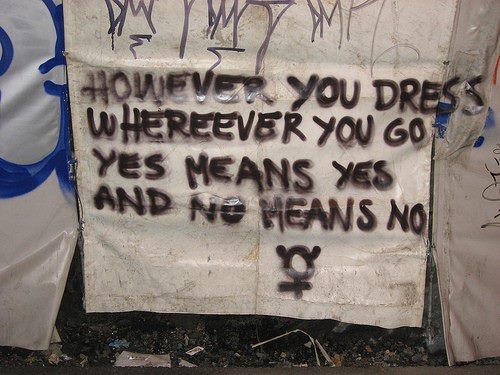Je Connais un Violeur (“I know a Rapist”) was a project founded by Pauline Arrighi. A participatory blog, the project works against stigmatisation of rape and as an outlet for victims to share their testimonies anonymously. It recognizes that many women who have been raped knew their assailants, and acts as a platform for support and expression. Rising Voices interviewed Pauline about the decision to start this project, it's successes, and its influence.
Why and when did you start this project?
Many rape victims are not believed by those around them. So, many of them do not have the strength to denounce their abusers. Thus, they end up suffering from a lack of recognition from others of what happened. Worse, they are sometimes accused of lying – even before there has been any investigation conducted to prove the facts.
In other cases, victims are traumatized and they do not realize that they were raped. They find good excuses for the actions taken by their abuser and end up lying to themselves about what really occurred.
One of the reasons for this disbelief and even hostility towards rape victims comes from false assumptions about rape. Many myths surround it, and one that I specifically wanted to work against: that rapists are not all marginal psychopaths who jump on their victims in dark back alleys at night.
There is no profile of the “typical” rapist, most of them are socially integrated and, more importantly, in 80% of cases the victim knows the rapist.
To read the testimonies of victims is an excellent thing to do.

Photo of street art taken in Paris (published with the author's permission)
If we tried to describe a typical rapist, what would he be like? Crazy, sexually frustrated, poor, a drug addict? Or would we find him to be just like any other man? What better way to find out the answer to this question than to ask their victims to explain?
Whether a complaint has been filed or not, whether the rapist has been convicted or not, let them draw for us a portrait of this person, under a veil of anonymity, for both (I am very careful that no portrait is sufficiently accurate and to identify anyone).
I launched the project one evening on August 30th, 2013. I began by writing down testimonies gathered from the people around me. I posted the link on various social media. 48 hours later, I had received 150 additional testimonies…
How many testimonies have you received so far?
“Je connais un violeur” has spread extremely rapidly through Twitter and Facebook. I received 500 stories in the first week, and 1200 subscribers. After only one month, the project now has about 1000 testimonies and the website has received 900,000 visits.
How is the project perceived by readers? Have you had any feedback from contributors after their testimonies?
I receive a minimal number of skeptical feedback for readers, 3 or 4 out of 1000 stories. On the other hand, I have also received many words of thanks. Some people became aware of their own experiences after reading other testimonials, and they were then able to name and explain their own stories, and to make sense of feelings of uneasiness. Others realize that they are not alone, while some say that they feel vindicated now that their story is out there for others to read.
Some people – who were not victims – explain that the site has opened their eyes to a reality they were unaware of. For all these reasons, the project has gone beyond my initial goals, and I'm quite happy with this.
Does seeing their stories published also serve as catharsis for some victims ? Can testifying be part of the healing process?
Without a doubt. I have received many emails stating just that – but I am not in a position to elaborate on the subject, not being a professional, a psychologist, etc.
However I can refer to the excellent Muriel Salmona, a psychiatrist specializing in trauma and the author of Livre Noir des Violences Sexuelles [Fr] (the Black Book of Sexual Violence) [the following quoted from the French newspaper Liberation]:
Les victimes se disent toujours «je n’aurais pas dû faire ou dire ça.’ Elles se remettent en cause. En parler, échanger leur expérience et analyser la démarche de leur agresseur permet de remettre leur monde à l’endroit, de réaliser, enfin, que ce sont elles les victimes. C’est le premier pas vers la réparation.
The victims are always saying ‘I shouldn't have done that or said that’. [But] they reconsider this. In speaking, exchanging their experiences, and analysing the approach of their aggressor allows them to realize, finally, that they themselves are the victims. It's the first step towards healing.
How do you select which contributions to publish ? How many stories are not published and why?
As a general rule, I only publish stories that give a portrait of the aggressor, as indicated in the “about” section, and if it is a rape (I ignore touching and other attempts). That being said, certain testimonies do not fall into this editorial line but they are still published because they are emotionally powerful, or because they bring a valuable component to this reflection on rape and the ways in which it is socially perceived.
As the manager of the site, how do you manage your own anger and sadness after reading all of these stories ?
Not well (smile).
But seriously, reading these stories is obviously difficult, and I'm in a relatively powerless position because there is only so much one can do via a website. I cannot replace the work of a listener on a hot line, and even less so of an e-therapist.
Fortunately I get help sometimes, and I am part of a women's network that is familiar with these problems. I am fortunate that my approach is understood, and have not been subjected to “rape jokes” and those other things that happen online.
Are there more actions that we can do as a society to help protect victims?
Rape is only one manifestation of the perception and status of women in society. Once we stop presenting women as sexually available and submissive in advertisements, fiction, and so on, once we stop presenting women as objects and men as dominant, active beings with irrepressible sexual needs (which is absolutely false), the number of rape will perceptibly decrease.
There are specific measures that can be taken :
1) to be relentless against those who share incentives to rape* [Fr] and sexist hatred.
2) develop a strategy for emotional and sexual education in schools and colleges. We can not let the porn industry be the only source for sexual education for our youth.
With your point of view, how do you analyze the evolution of the taboo on rape and the impact of a site like yours? Is there a trend among these stories that would not necessarily be perceived by causal readers?
The trend that emerges most often is the feeling of guilt and shame felt by victims. To re-emphasize this point, a rape victim is never responsible for what has happened. So if the victim feels, in an illogical role reversal, guilty about what happened, it is also due to the discourse around rape which she would have heard even before her assault. If you hear throughout your youth that rape victims more or less had it coming… how can you not hate yourself if it happens to you ?
This feeling of guilt and denial also comes from the very experience of rape itself. In many testimonies we read that not only is the physical integrity is denied, but the perpetrator denies the will of the victim, believing that the victim is consenting. “I know you like it”, ” I know you want it”… rape involves not only the body but also the mind…
What would you like to see changed from a public policy point of view on the approach to this problem ?
…Fighting against gender stereotypes in school, with sexual education which takes into account notions of respect for the integrity of the other and of desire, fighting against the degraded image of women in advertising, porn movies, internet and society in general.
Rape is only a manifestation of representations of women and men in society, it is not natural, it is a fact of culture against which we can fight. There are societies where rape does not happen. Why not ours?
*The link above to the article in Le Plus recounts the story of a group of feminists – of whom Pauline Arrighi is a member – which sent a report to the press about website which was arguably inciting men to commit rape within their relationships and among groups of friends.




